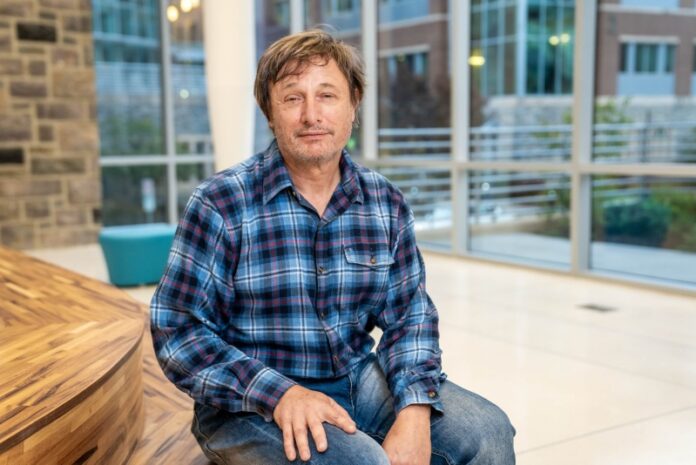Robert Gourdie, a cardiovascular scientist, biomedical engineer, and professor at the Fralin Biomedical Research Institute at VTC, has been named to the American Institute for Medical and Biological Engineering (AIMBE) College of Fellows.
Gourdie will be inducted along with 152 colleagues who make up the AIMBE Fellow Class of 2022 during a virtual induction ceremony on Friday.
The AIMBE College of Fellows consists of the top 2% of medical and biological engineers in the United States. Gourdie was nominated and elected by peers for pioneering new treatment approaches that use short amino acid chains called peptides to encourage wound healing or fight cardiovascular diseases and cancer.
The nomination recognized his contributions to translate basic scientific discoveries into therapeutic approaches to help patients.
“It is an honor to be considered among the leaders in biomedical engineering,” said Gourdie, the Commonwealth Research Commercialization Fund Eminent Scholar in Heart Reparative Medicine Research and director of the Fralin Biomedical Research Institute Center for Vascular and Heart Research. “My goal has always been to create treatment options and start biomedical companies to bring therapeutics to people coping with illness. This is further encouragement that we are on the right path.”
More than a decade ago, Gourdie and his then-postdoctoral associate Gautam Ghatnekar at the Medical University of South Carolina developed a novel peptide called alphaCT1 as a topical treatment to accelerate wound healing — a health problem for people with diabetes whose wounds tend to heal more slowly.
Gourdie and Ghatnekar formed a biopharmaceutical company, FirstString Research, to bring the drug to clinical trials and the marketplace.
At Virginia Tech, Gourdie co-founded Acomhal Research Inc., a cancer research company in Roanoke, Virginia, with Samy Lamouille, an assistant professor at the Fralin Biomedical Research Institute. The biotech startup is undertaking preclinical development of a novel drug, JM2, to target cancer stem cells to prevent the cancer from spreading.
In addition, Gourdie has found a new way to extract and purify nano-containers that naturally occur in milk to transport fragile medicine throughout the body — a technology he is developing through a Roanoke-based spinoff called Tiny Cargo Co.
“Dr. Gourdie’s election as a fellow of the AIMBE recognizes his tremendous work to create biomedical solutions to health care challenges, not just through scientific discovery, but also through exceptional entrepreneurial skills,” said Michael Friedlander, executive director of the Fralin Biomedical Research Institute and Virginia Tech vice president for Health Sciences and Technology. “In addition to his scientific and business prowess, the Virginia Tech community can be proud of Dr. Gourdie’s commitment to graduate education and his skill at providing experiential learning opportunities to students from a range of academic disciplines.”
Gourdie recently became Virginia Tech’s first-ever recipient of an Outstanding Investigator Award from the National Heart, Lung, and Blood Institute of the National Institutes of Health. The seven-year, $6.4 million grant provides Gourdie with increased freedom to carry out inventive research concepts.
Gourdie received a master’s degree in cell and molecular biology from the University of Auckland, and his doctoral degree in biophysics from the University of Canterbury. He then completed a postdoctoral fellowship in developmental biology and anatomy at University College London. He served on the faculty of the Medical University of South Carolina before joining the Fralin Biomedical Research Institute and Virginia Tech’s Department of Biomedical Engineering and Mechanics in the College of Engineering in 2012

